The Contribution Of Carbon Taxes To Economic Progress In Indonesia
DOI:
https://doi.org/10.35814/jrb.v7i1.5536Abstract
The implementation of carbon taxation is considered a more straightforward approach to managing climate change in Indonesia compared to the Emissions Trading System (ETS), as it offers a simpler execution process. Carbon tax is a derivative of Pigouvian tax, involving levies on economic activities that have negative environmental impacts. This aligns with the government's efforts to achieve medium and long-term emission reduction targets, combating hazardous greenhouse gas emissions.This research aims to identify carbon tax's potential as a revenue source for national progress. It is a literature-based study utilizing secondary data from both national and international journals. The research findings emphasize that carbon tax is a suitable and necessary alternative for Indonesia in addressing global warming and climate deterioration, while promoting economic development.Furthermore, carbon taxation holds the potential to augment state revenue through an expanded tax base, indirectly curbing carbon emissions and greenhouse effects. Therefore, carbon tax emerges as a solution to safeguarding the environment and fostering economic growth, as outlined in Indonesia's Medium-Term Development Plan for 2020-2024.


.gif)













